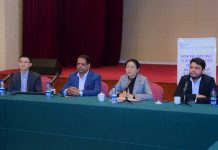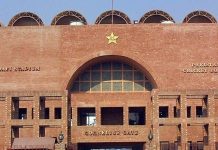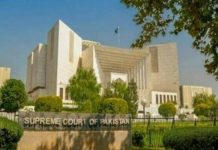ISLAMABAD, June 3 (NNI): The Supreme Court of Pakistan adjourned the hearing of the Sunni Ittehad Council’s (SIC) plea against the Peshawar High Court’s verdict, which denied it reserved seats for women and minorities, until tomorrow (Tuesday).
The development occurred as the 13-member full court bench of the Supreme Court took up the SIC’s plea challenging the PHC’s judgment regarding the reserved seats.
Chief Justice of Pakistan (CJP) Justice Qazi Faez Isa stated that the Supreme Court of Pakistan will seek a response from the Election Commission of Pakistan (ECP) regarding the allotment of additional national and provincial assembly reserved seats to other political parties.
The CJP made the remarks as a 13-member full court conducted a hearing on Monday of the appeals filed by the Sunni Ittehad Council (SIC) and Khyber Pakhtunkhwa (KP) Assembly speaker in the SIC’s reserved seats case.
The bench, headed by Chief Justice of Pakistan (CJP) Qazi Faez Isa, comprised Justices Syed Mansoor Ali Shah, Munib Akhtar, Yahya Afridi, Aminuddin Khan, Jamal Khan Mandokhail, Muhammad Ali Mazhar, Ayesha Malik, Athar Minallah, Syed Hasan Azhar Rizvi, Shahid Waheed, Irfan Saadat Khan, and Naeem Akhtar Afghan.
Justice Musarrat Hilali is not included on the bench due to health issues.
The CJP remarked that it was a reality that the SIC had not contested the elections. He then sought the record of PTI’s merger into the SIC, saying, “How can they accept just one document in this regard?”
During the hearing on Monday, SIC’s lawyer Advocate Faisal Siddiqui said that political parties like PML-N, PPP, IPP, and JUI-F were given additional reserved seats that belonged to the SIC.
Elaborating further, he said that out of 21 such seats distributed among parties in Punjab, 19 were given to the PML-N, while one each to the PPP and IPP.
The chief justice said the bench would seek a reply from the Election Commission of Pakistan (ECP) on that.
The counsel for the ECP told the court he would submit his reply after going through the details of the allotting of the reserved seats.
The CJP questioned how eight seats of the National Assembly (NA) were distributed among parties in KP. Advocate Siddiqui informed that four were given to the PML-N, two to JUI-F, and PPP each. “MQM-P was given one additional seat for women in the Sindh Assembly,” he explained.
He went on to say that the PML-N and the PPP were given nine and two NA seats in the Punjab Assembly, respectively.
Speaking on the occasion, Justice Athar Minallah said that the ECP had recognized that the SIC was a political party.
Justice Jamal Mandokhel asked whether the ECP had the power to declare a party ‘independent’. “Whether the candidates of a political party can join any other party after getting elected,” he asked.
The CJP asked whether the parties, which had been given additional reserved seats, were made respondents in the case. SIC’s lawyer replied in the negative. “Don’t you think that these parties should have been made respondents?” the chief justice questioned.
Agreeing with the CJP’s observation, Advocate Siddiqui said he also holds the same opinion that notices should have been issued to these parties.
Justice Mandokhel asked when a party acknowledged that it had fielded a candidate and the candidate too showed his association with the party, did the ECP have the power to declare that candidate ‘independent’?
Faisal Siddiqi further stated that the allocation of the reserved seats to other parties was in violation of Articles 51(vi)(d) and (e) of the Constitution. He read out an ECP letter dated April 24, stating that the SIC was a parliamentary party “having 82 general seats in the National Assembly” and was therefore entitled to reserved seats.
CJP Qazi Isa asked who the beneficiaries were in the case and to give a detailed breakdown of the reserved seats distributed to the ruling coalition parties above the initially allocated ones. Complying with the order, the lawyer informed the court that there were 22 seats for women in total in the NA. Siddiqi also pointed out that the electoral watchdog had “made a few mistakes” and had contradictory statements mentioning a total of “77 or 78” such reserved seats.
Justice Isa then asked Siddiqi about the party-wise breakdown of the additional seats allocated to them, which the counsel complied with. Siddiqi then also provided the court with details of such reserved seats in the provincial assemblies.
The CJP then called the ECP counsel to clarify the number of additionally allocated reserved seats for women in the NA, who then told the court that the commission’s position was “23 seats” and was confirming the same.
Siddiqi then also detailed the number of general seats won by each party in the February 8 elections, arguing, “This is important as we (SIC) are recognized as a parliamentary party.”
Justice Minallah here asked Siddiqi about the “chart” listing the above information, at which the lawyer said it was notified by the ECP. “So they have notified the SIC as a parliamentary party,” Justice Minallah observed.
The lawyer recalled that the candidates had joined the SIC within three days of their victory notifications.
Justice Mandokhail asked if the candidates who joined the SIC had received any party affiliation certificate during the nomination process. Justice Minallah repeated the same question: “When those 82 people filed their returns (notifications), did they show any political party’s affiliation?”
At Siddiqi’s response in the affirmative, Justice Mandokhail wondered how they were then called independent candidates. The SIC counsel responded that the ECP had told the candidates they could not contest the elections as a PTI candidate but as an independent. “Then the question arises whether the ECP can declare someone nominated by the party and who also wishes to contest as that party’s candidate as an independent. And secondly, does that candidate have the right that once they submit the nominations, they quit that party?” Justice Mandokhail asked.
CJP Isa asked Siddiqi if any of the beneficiary parties were “supporting” the SIC, to which the lawyer responded with a smile.
The counsels of the PML-N, the PPP, the Jamiat Ulema-i-Islam-Fazl (JUI-F), and the PTI-Parliamentarians (PTI-P) then came to the rostrum one by one and informed the court that they opposed the SIC’s petition. No counsel was representing the PML-Q, the Awami National Party (ANP), or the Istehkam-i-Pakistan Party (IPP). NNI






































